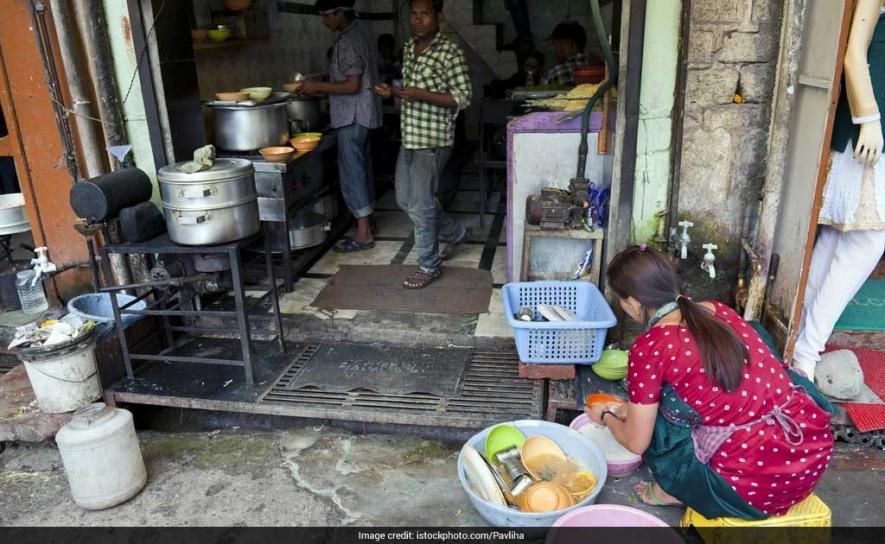Domestic Workers’ Movement Gains Momentum

Image used For Representation Purpose Only
On August 2, over 5,000 domestic workers marched on the streets of Delhi to demand a comprehensive law regulating their wages and withdrawal of the social security code proposed by the government in 2017.
Currently, there are over 6.4 million domestic workers in the country, who work at the household – cooking and cleaning among other activities. The sector, which was, at one point, male-dominated, has over 71 per cent women now, and has grown substantially. Yet, there is no comprehensive nationwide law that caters to them.
The rally organised by the National Platform of Domestic Workers (NPDW), was the latest in the line of efforts to demand a dedicated law for domestic workers. In the ambit of the existing policies, the workers end up being put in the bracket of the unorganised sector.
Elaborating on this, Anita Juneja, the convenor of the Delhi Shramik Sansthan, said, “The domestic workers are included in the The Unorganised Workers' Social Security Act, 2008, (UWSSA) and the Sexual Harassment of Women at Workplace (Prevention, Prohibition and Redressal) Act, 2013. These acts do not recognise the domestic workers as right-bearing workers, as the former is a social welfare scheme with the latter protecting women at workplace from sexual harassment.”
The domestic workers don't get recognised as right-bearing or as ‘recognised employees’ in the purview of these acts, as the workplace of domestic workers becomes a person’s household, and not an establishment. This gives unregulated powers to the employers of the domestic workers, as other labour laws including the Maternity Benefits Act or the Minimum Wages Act also don't apply to the domestic workers.
The ongoing momentum with respect to their rights has materialised following a signature campaign with over three lakh signatures gathered from across the country. Alongside the rally, the workers from over 37 trade unions and 22 states presented a petition to Union Labour Minister Santosh Gangwar as well as to the Petitions' Committee of the Lok Sabha.
At the policy level, attempts to propose a draft bill focusing on social security and welfare of the workers was proposed in 2016 by Congress MP Shashi Tharoor. To ensure passage, the bill has been tabled as a private member bill as well.
The ongoing efforts had resulted in the Government of India proposing a draft policy for domestic workers early this year. The policy focused on the registration of workers and integrating them into the social security net by fixing minimum wages and work timings. Since this proposal is a policy draft, it was critiqued for being toothless, as it could only suggest recommendations, leaving the decision and the implementation of its recommendations to the states. The state government will have the responsibility of setting up boards and registration of the domestic workers. The powers of setting up wages and formulating mechanisms to regulate placement agencies were also concentrated in the hands of the states, thus bypassing the need for a central legislation.
In the latest attempt to bring about labour reforms in the country, the government plans to combine over 44 laws into four codes; this also includes the Social Security Code, which combines 15 laws. In a first of its kind move, the government included domestic workers in the Social Security Code proposed in 2017.
The Centre introduced the draft of the proposed code in March 2017. While the inclusion of domestic workers in the code to be implemented across the country seemed progressive at first, the move has left activists working towards the rights of the domestic workers disappointed.
The activists argue that the labour reform codes are set to benefit the corporate entities and the government, and are not in workers’ interests. Thus, a key demand of the workers rallying in Delhi is the withdrawal of the proposed code. Commenting on the reasons for the demand of the withdrawal of the code, Juneja said, “The proposed system does not give any support to the domestic workers.” Instead of a comprehensive legislation on the domestic workers that will regulate working conditions, wages and operations of the placement agencies, the government is pushing for a bill that will create central codes to ease the contracts of employment for the employers and scrap existing labour laws.
The proposed code suggests repealing of various labour laws, including the Employees’ State Insurance Act, a self-financing social security and health insurance scheme for workers, and the Employees’ Provident Fund Act. The Government’s code would create one welfare board for both organised and unorganised workers, where the unorganised workers will have to pay 12 per cent of their wages towards the fund (similar to the organised workers), and the employers, 17 per cent of wages. However, the code clearly mentions that the central government would make no contribution towards social protection, but it will have majority of the representation and control over social security through the fund.
The provision of pension, sickness benefit, medical benefit, etc. will be provided, but their sphere has been broadly defined, and the quantum of benefits has not been stated.
There are also concerns over administrative hassles. In order to avail the benefits, the workers will have to get themselves authenticated by their employers and recognised through a VishwaKarma card. This process is likely to cause problems for workers. For example, a domestic worker offering their services to five houses will now have to get recognised by all the employers. This process may be particularly difficult, as employers are reluctant, given that all the laws that apply to an establishment will now be applied to their house – such as decent work conditions, wages etc. Post the administrative procedures, Once the employee submits its contribution to the social security fund, the code proposes that the amount will be declared as a ‘surplus’ and this amount will be transferred from the state boards to a central board for professional management of the money. So if the Delhi government wants to implement a welfare policy, and use the money from the fund, it will first have to seek approval from the Centre through a proposal.
The code proposes that this amount collected in the fund may also be used by the government for investments to ‘maximise returns’. In other words, the money collected from the workers can be invested in the market by the government. This raises serious questions about the accessibility of the money by the workers in case of any loss on the proposed ‘good returns on the investment’.
The current schemes of the Employees’ State Insurance Corporation (ESIC) and the Employees’ Provident Fund Organization (EPFO) make it convenient for the workers to stake claim of their income at the time of leaving the service or retirement. The proposed code does not suggest the returns on investing the money in the fund in case of the same.
As the proposed code also suggests that the tasks such as registration of the workers, management of contribution, record keeping, services and provision of benefits will be privatised, there are concerns regarding EPF and SIC being made redundant.
Ramendra Kumar, an activist associated with Labour Rights Delhi, said “We will be taking the struggle of domestic workers further. There are multiple meetings planned ahead, and we are getting support from multiple political quarters”.
When asked about communication from the side of the government or the BJP-affiliated BMS, Juneja said, “The BMS has refused to offer support to us, so we will focus on mobilising other groups to join the struggle.”
The proposed draft, although includes the domestic workers, it does not fulfill the demand of providing a comprehensive legislation that focuses exclusively on the interests of domestic workers. In the present form, it ends up being reduced to what seems like another attempt by the Centre to seize the money from the poor workers to support its vision of privatisation and attracting large-scale investment, even if it risks the loss of hard-earned money of the workers.
Get the latest reports & analysis with people's perspective on Protests, movements & deep analytical videos, discussions of the current affairs in your Telegram app. Subscribe to NewsClick's Telegram channel & get Real-Time updates on stories, as they get published on our website.
























